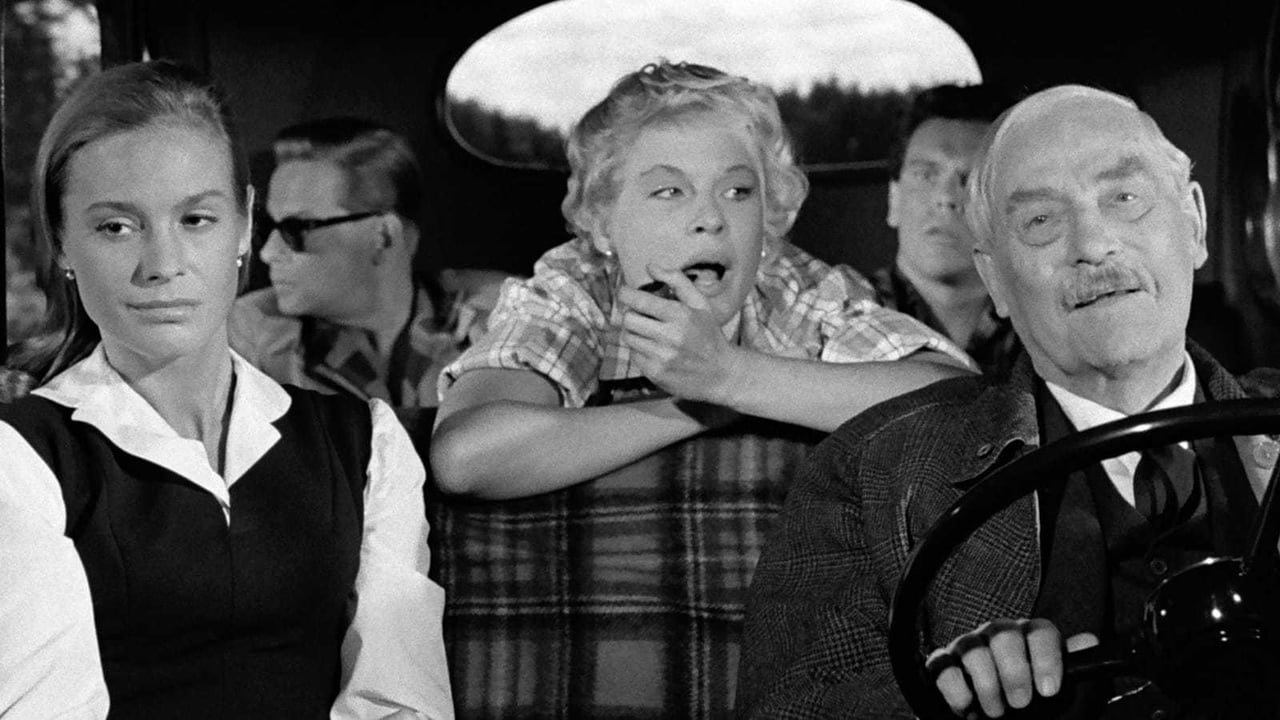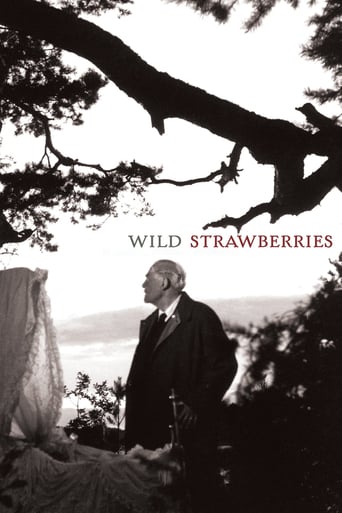pointyfilippa
The movie runs out of plot and jokes well before the end of a two-hour running time, long for a light comedy.
Mischa Redfern
I didn’t really have many expectations going into the movie (good or bad), but I actually really enjoyed it. I really liked the characters and the banter between them.
Bessie Smyth
Great story, amazing characters, superb action, enthralling cinematography. Yes, this is something I am glad I spent money on.
Calum Hutton
It's a good bad... and worth a popcorn matinée. While it's easy to lament what could have been...
njp-76097
I think Dr. Borg's car deserves a credit too. It seems to be a Packard 1937. Thank you.
thinbeach
Wild Strawberries is at once a road trip film, and a trip down memory lane. 78 year old Isak journeys through idyllic forestry on the way to a ceremony that celebrates his life achievements as a doctor. He travels with his daughter-in-law, picks up a young trio hitching their way to Italy, and briefly, an arguing couple who they were involved in a car accident with. He recalls past memories of his younger days, and has bad dreams. It plays out less like narrative fiction than a hodge-podge diary entry, things occurring spontaneously. This means no one mood is ever built upon in layers, rather it ebbs and flows almost without structure. There are themes of death hanging over the film, unanswered questions regarding God and science, bickering and co-operation between men and women, the contrast of expression between young and old, and an appreciation for the beauty of life and the honour of career based achievements, contrasted with incidents recalling great sadness, and a failure in personal relationships - from lost loves, cheating partners, and forgotten family. Although Isak appears quite endearing and the film takes a sympathetic viewpoint, he is nonetheless faulted for his past cold aloofness which caused the women to cheat, yet the women and the partners they took up with are also faulted for their lack of principal. And when Isak attempts a greater warmth towards his maid in the final scene, she rebuffs him, long set in her own manner. In this fashion Bergman veers away from giving cliché or easy answers, and manages to capture the complexities of human relationships.Aside from hints that Isak's remaining days are limited, there is not a great deal of tension in the film, meaning it is more poem than a blockbuster. Yet it manages to maintain interest due to the emotional sway, and all encompassing themes - which are ever present, yet never preached. It is a quest for meaning, where the filmmakers wish not to give the answer, but capture the journey - for which a road trip proves a suitable metaphoric vehicle. The freewheeling nature of it helps prevent the weighty themes from becoming too morbid, and feels just as though they would on any road trip spent staring out the window. Vivid and distant at the same time.
federovsky
The first time I saw this many years ago I wasn't particularly impressed. I couldn't see how it appeared on so many 'best films of all time' lists. I still can't. There's really very little here. An old man has a few wistful memories. Uh huh...and...? The main problem is that the old man is simply not worthy of interest. He has had a distinguished career as a doctor and is on the way to pick up an honorary degree. Are we supposed to sympathise with such a successful life? And, quite amazingly, his mother is still alive, a sprightly woman in her nineties. Life and death doesn't really come into context until both your parents have died (so I found), so the mere existence of this old woman undermines much of the poignancy the old man is supposed to be feeling. This women is even older - let's hear about her instead.Then we have the white-flannelled folk in the dacha about whom we learn more than we want to know but not enough to make them interesting. None of it was adding meaning or emotion or even an introspective feeling about life and death.There isn't even any sense that the old man is going to die any time soon - he looks good for another ten years or so. Nor does he come to any startling Scrooge-like conclusions of his own past. He is supposed to be crabby and antisocial but he doesn't appear that way at all - another thing that undermines the film's own intentions.And Bergman is guilty of using too-obvious metaphors again: the three young hitchhikers are so clearly intended to represent youthful devil-may-care that they are impossibly idealised and behave like no human beings you will ever come across in your lifetime - no more than cartoons.At best, it's a decent little chamber piece, but it's intellectually impoverished and misses it's own targets by a mile. I can't see anything great about it. Sorry Ingmar.
Christopher Culver
The actor, screenwriter and director Victor Sjöstrom was a major figure in the silent film of the early 20th century. Decades later, when film had long since transitioned to talkies and Sjöstrom had disappeared from the scene, focusing instead on theatre, Ingmar Bergman called him back for the 1957 effort WILD STRAWBERRIES. And instead of trying to evoke the great achievements of Sjöstrom's younger days, Bergman let this now 78-year-old man depict with no holds barred what old age and the thought of imminent death are really like.As the film opens, we are introduced to Professor Isak Borg (Sjöstrom), who started out as a provincial doctor but made some new medical discoveries and established a shining career in academia. Borg must travel to the distant Swedish city of Lund to accept an honorary degree from the university there, and he decides to drive the whole distance. He is accompanied by his daughter-in-law Marianne (Ingrid Thulin), who had been staying with him after a row with Borg's son Evald, and who eventually takes the wheel for the old man. Along the way they pick up three young hitchhikers, and later they get into a fender-bender with an unhappy married couple.Initially Borg's housekeeper and Marianne are puzzled that the elderly professor wants to drive all that way, but we soon discover that the route passes some places from Borg's younger days. Flashbacks that are shown during stops, and the professor's own dreams as he doses off, reveal feelings of regret and guilt that the old man had been harbouring all his life. The three hitchhikers in the bloom of youth remind Borg even more sharply of his elderly state, and the married couple only serves as a reminder of his own unhappy family life. He is tormented by the thought that he has little time left to set things right with those close to him that he had alienated years, even decades, before.WILD STRAWBERRIES is very touching, and it is one of those films where the main character is played in such a great bit of acting that all the other details hardly matter. Still, the supporting roles are memorable. Bibi Andersson plays two roles that are worlds apart. In one, Andersson is the main hitchhiker character, a sort of liberated woman and tomboy. The other role is Borg's early love interest, a woman reflective of upper-class society in early 20th-century Sweden with all its strict ideas about proper female behaviour. Other longtime members of Bergman's stable appear: Max von Sydow as a rural petrol station attendant, and Gunnar Björnstrand as Borg's son that takes all too after the old man.In spite of the film's strengths, I must admit that WILD STRAWBERRIES is not among my favourite Bergman efforts. It seems especially flawed by one subplot: among the hitchhikers that Borg takes, two of them are always squabbling about whether God exists. I find this bears very little relationship with the protagonist's dilemma (Borg himself doesn't muse on what they say), and instead it's like Bergman was trying to shoehorn in the religious themes of his other major films of this era, such as THE SEVENTH SEAL. Still, even what I feel to be lesser Bergman is still great cinema, and I imagine most viewers will enjoy this poignant tale.

